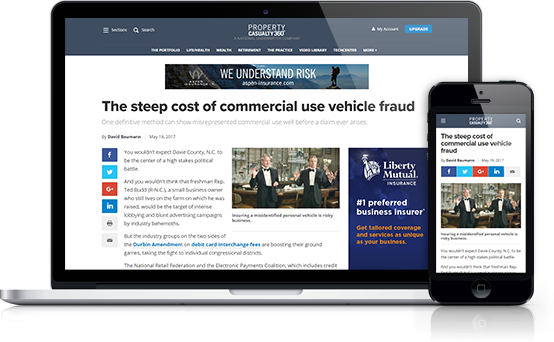 Recent data from The Hanover’s Home Water Loss Prevention Report, a study commissioned by Harris Poll, revealed a surprising lack of preparedness among homeowners when it comes to non-weather-related water damage.
Recent data from The Hanover’s Home Water Loss Prevention Report, a study commissioned by Harris Poll, revealed a surprising lack of preparedness among homeowners when it comes to non-weather-related water damage.
In fact, non-weather-related water damage resulting from everyday issues like pipe leaks or malfunctioning appliances is the second most prevalent cause of home insurance loss claims. But despite the high risk, only 17% of homeowners have water sensors installed in their homes. With this in mind, it’s not surprising that we see more and more independent insurance agents adding preventative risk consultation to their toolkit of ways to provide valuable services to clients. The best protection is prevention, and strategic agents are educating their clients specifically about the common and disruptive risk of non-weather water damage – and the preventive measures they can take both to avoid and minimize damage.
By recognizing homeowner priorities, agents can better address concerns and highlight the importance of water damage prevention without disregarding other areas of protection. Here are four ways agents can engage customers in-home water loss discussions.
Educate Homeowners About the Risk of Non-Weather Water and Prevention Technology – A key finding in The Hanover’s Home Water Loss Prevention Report was that 61% of customers had never heard of an automatic water shut-off device – and 68% had never heard of a water sensor. It’s important for both agents and customers to understand the difference between the two devices to help customers make the best decision to protect their homes. Automatic water shut-off devices helps to provide one of the best overall protection as they will shut off the flow of water automatically if a potential issue is detected. This is a great option for those who travel relatively often or have secondary homes. On the other side, water sensors do not shut off the water, but they can alert a homeowner early to an issue and stop it from causing further damage.
Discuss Water Flow Within a Home – When homeowners think of water damage to their home, they may first think of catastrophic events – like hurricanes or floods. But some of the most disruptive losses come from within the home. To be proactive, homeowners should know where water is moving in their homes. This can be especially important for homeowners who just recently moved into a new home and may not yet be familiar with their main water shut-off valve, pipes that are less insulated and more likely to freeze, and other factors that take time to get to know about the home you live in. Our agents are educating consumers about the importance of knowing the location of the main water shutoff valve, maintaining appliances connected with water and monitoring water usage. When homeowners familiarize themselves with the location of the main water shutoff valve ahead of a burst pipe or plumbing emergency, shutting off the water quickly can minimize damage.
Highlight the Role of Discounts and the Ease of Installation – According to our study, 86% of customers cited a reason they would install a device in their homes. The most common was when they understood the sensors would qualify for a reduced rate on their home insurance and how easy they are to install. Therefore, it’s very helpful when agents emphasize the potential discounts offered by carriers and convey the steps of the installation process. Many automatic shut-off devices today require professional installation. Water sensors are a DIY solution for homeowners to alert them to an impending issue early, leading to less severe damage. But for these to be most effective, homeowners need a few of them placed in key areas prone to leaks, such as under sinks and appliances like dishwashers and washing machines. Both options could potentially qualify a customer for a reduced rate on their home policy.
Collaborate with Plumbers and Contractors – The third reason respondents cited would make them likely to install a device – a recommendation from a professional plumber. Sensor and shut-off device technology can vary, and some homeowners may feel unsure which option is best for their home. For those seeking a solution to shut the water off, consulting with a professional can help them feel confident they have the right device for their home as well as install it appropriately. Independent insurance agents can establish partnerships with local plumbers and contractors to provide additional credibility. Many agents already have these contacts as business customers, which gives them a unique opportunity to build these relationships and connect those who can install the devices to those who need them. By leveraging these relationships, agents can provide homeowners with trusted resources to ensure a seamless experience.
By engaging in proactive education and conversations, our agents are helping their customers identify potential problems, find the solution that best meets their needs, and reduce the risk of inconvenient and invasive water-related losses. This emphasis on risk prevention devices not only empowers responsible homeowners to take proactive steps to protect their homes but also is an additional way independent agents can differentiate their service and the value they offer their customers.










 Copyright © 2025 ALM Global, LLC. All Rights Reserved.
Copyright © 2025 ALM Global, LLC. All Rights Reserved.